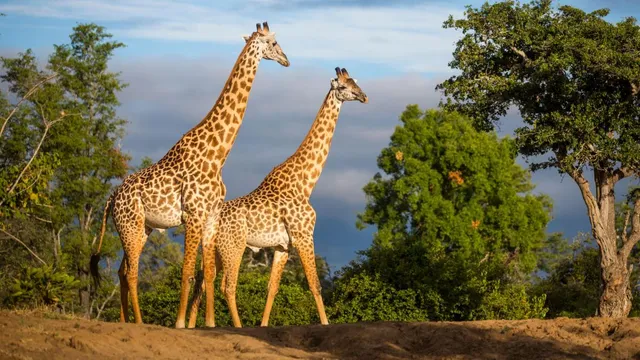
Chichele Presidential Lodge reopens after years of closure
2025-04-04 19:00- Chichele Presidential Lodge in South Luangwa National Park reopened after being closed for seven years.
- The lodge has a storied history of hosting distinguished guests, including Queen Elizabeth II.
- The renovation modernizes the lodge, enhancing Zambia's appeal in the upscale safari tourism market.
Express your sentiment!
Insights
In the heart of Zambia, the Chichele Presidential Lodge, located in South Luangwa National Park, has reopened after undergoing a seven-year closure. Originally established in 1972, the lodge has hosted numerous high-profile guests, including Queen Elizabeth II and former Ugandan dictator Idi Amin, making it a notable site in the luxury safari landscape of Africa. Upon returning to the lodge, visitors will find a modernized structure that moves away from its colonial past, thanks to South African architect Jack Alexander, who designed the new terracotta-colored lodge that blends contemporary aesthetics with African charm. This revamp comes under the management of the politically connected Yousuf brothers, Zuneid and Irfaan, who assumed control in 2018. Their vision has attracted top architects, interior designers, and safari operators to create an unparalleled safari experience. The lodge is situated with breathtaking views of the Luangwa River and the surrounding park, offering guests an immersive natural experience that is further complemented by luxurious features and amenities. During a recent visit, the first since its reopening, guests enjoyed exceptional wildlife sightings typical of the South Luangwa ecosystem. Among the highlights were leopards with cubs, a pride of lions, and various wildlife encounters that recreate the magic of a classic safari experience. Guided tours led by experienced rangers and naturalists are now part of the offerings, providing a comprehensive exploration of the region’s rich biodiversity. Guests can participate in walking safaris, which allow a closer connection with the vibrant environment. As Zambia continues to enhance its status as a prime safari destination, the reopening of Chichele Presidential Lodge represents a significant advancement that strengthens the upscale safari circuit in the country. With a renewed focus on luxury and sustainability, it reflects a commitment to both preserving the unique wildlife of the region and providing enriching experiences for visitors. The lodge's reopening signifies not just the return of a historical locale, but also a moment of revival for Zambia's tourism sector, inviting guests back to the splendor of an exquisite African safari vacation.
Contexts
Tourism plays a significant role in Zambia's economy, serving as a vital source of revenue, employment, and foreign exchange. The country is renowned for its breathtaking landscapes, diverse wildlife, and cultural heritage, which collectively attract millions of tourists annually. Iconic attractions such as Victoria Falls, one of the Seven Natural Wonders of the World, and various national parks, including South Luangwa and Kafue, showcase Zambia's natural beauty and biodiversity. These sites not only enhance the nation's global image but also contribute substantially to local and national economic growth through tourism-related activities. The economic impact of tourism in Zambia is multifaceted. It generates direct sales revenue for local businesses and service providers, including hotels, restaurants, and tour operators, thereby stimulating the economy. The sector also creates numerous jobs, both directly in tourism services and indirectly in auxiliary industries such as agriculture and crafts. Furthermore, tourism promotes rural development as many attractions are located in less urbanized areas, providing locals with job opportunities and encouraging the preservation of local culture and traditions. The employment generated is crucial for combating poverty and supporting community development initiatives. In addition to job creation, tourism in Zambia contributes significantly to government revenue through taxes and levies imposed on tourism providers. The financial resources generated enable the government to fund essential services and infrastructure development, further enhancing the tourism experience for visitors. Investments in infrastructure, such as roads and airports, benefit both tourists and local communities, making areas more accessible and helping to stimulate further economic activities. The introduction of policies aimed at promoting sustainable tourism practices ensures that the economic benefits can have a long-term positive impact while preserving the environment for future generations. However, the tourism sector is not without challenges, notably the volatility of global tourism trends, which can be influenced by factors such as political stability, economic downturns, and global health crises. Investment in marketing and improving the tourism product is essential to maintain Zambia's competitiveness in the regional and global tourism landscape. As Zambian authorities continue to recognize tourism's critical role in economic development, efforts to promote responsible and sustainable tourism practices will be pivotal in maximizing the industry's contributions to the economy while safeguarding the country’s natural and cultural assets.